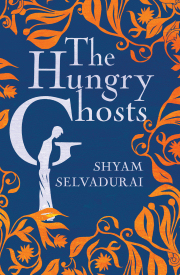I first read Shyam Selvadurai in the early 2000's -reading 'Funny Boy' instead of completing an assignment in a favourite spot in a musty
university library. Even back then, I was captivated by the writing style and
the open honest way the feelings and emotions of an adolescent boy growing up
in Sri Lanka was described in that book.
Many years later, after a long wait in the holds queue of my
local library in Melbourne, I had the chance to read 'The Hungry Ghosts'. This is Shyam's
fourth novel, published in 2013. The fact that I read the 374 pages of the book
in two days is a testimony to Shyam's great writing. It is amazing how in 'Hungry Ghosts' Shyam weaves
together a rich tapestry blending in threads from Sri Lankan politics, racial unrest
and homophobic attitudes in Sri Lanka, mental dislocation after migration and
the many different versions of love. In this book he takes us on a journey
through row houses in Pettah, mansions in Cinnamon Gardens and across lanes,
byways and bridges of Vancouver and Toronto. He propels us into the past- to
the girlhood of the matriarch grandmother, and in an instant brings us back to
the present, winding the story around Shivan- the narrator's life and the lives
closest to his. In 'The Hungry Ghosts' Shyam immerses the reader in emotions in
such a way that we are often left breathless and fighting for life. The pain of
loss, betrayal and desperation is described in such a way that the reader loses
touch with reality, and lands in the midst of the turbulence of the described
scene from time to time.
"I would remember something I wanted to tell him, then
realize I could not do that anymore. Whenever I slipped up like this, I felt no
pain or grief, just an emptiness that both surrounded me and was inside me, as
if I were encased in a casket of thick silence; as if I were silence
itself." p.247
"When she was done, she would stand by the table, watching
us as we took our places. Her food, because it had been prepared in such anger,
was often unpalatable, but if we didn't finish everything she served, or avoided
a dish, she would rail at us for being ungrateful, the words tripping out so
fast she stammered." p.129
For me, the best part of 'The Hungry Ghosts' was the way it was
peppered with 'Sri Lankanisms'. From describing the mood of a situation by the
subtle differences in the usage of Sinhala language to the outright, ultimate
Sinhalese insult, the novel is dotted with unique wisps of Sri Lanka
"When Rosalind was done my mother asked "Does that one
come around anymore?" she used the derogatory 'araya' to refer to him and
Rosalind knew exactly who she meant"
p. 291
"Come, Puthey" my grandmother said, referring to me by
the affectionate extension of putha, son.p. 4
Shyam has used bits of Buddhist and Sinhala folk stories to
embellish his narrative, and has thus given another dimension- another
perspective to the story. These are like lace that adorns a loved garment. Not
totally necessary, but adds a touch of charm. The stories about the thieving
hawk who in the end lets go of the piece of meat that caused it injury and
suffering, King Nandaka whose path disappeared behind him as he headed towards
a haunt of perethayas, and the naked perethi who is surrounded by food but has
no mouth to feed, though starving- all have an underlying connection to the narrative.
Through these, Shyam has simply said a lot without saying much.
I remember how in Sinhalese there are two words for rice:
"haal" for the hardened grain, which becomes "buth" when it
is boiled. In speaking of our inability to reverse actions, our inability to
change karma's ripening, we say that haal, once it has started to become buth,
cannot revert to being haal. p.131
'The Hungry Ghosts' was shortlisted for both Toronto Book Awards
and the Governor General's Literary Award for Fiction and Long listed for the
DSC South Asia Literature Prize.
All in all, for me Hungry Ghosts is a superb read, mainly
because it flows easily and naturally. How serendipitous it is to read a novel
that touches the heart, so far away from one's roots, written by someone also
living far from his roots- all the way across the world! Congratulations Shyam,
many more of these please.
I


තැන්ක්ස්.. මම කියවලා නැහැ... ගුඩ් ආර්ටිකල්
ReplyDelete